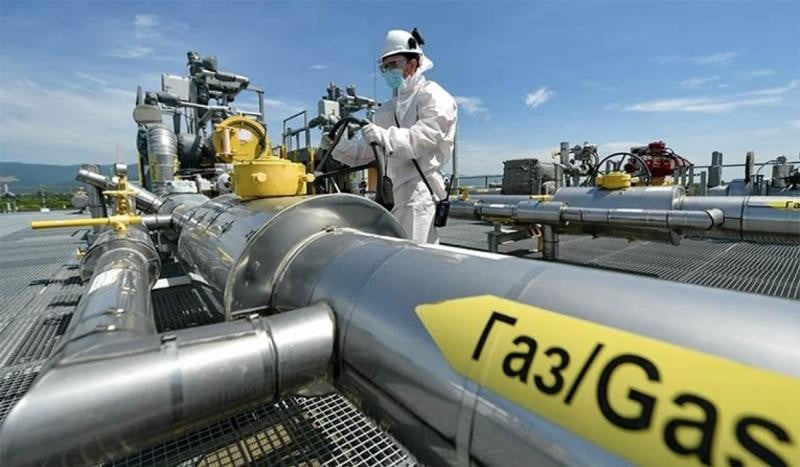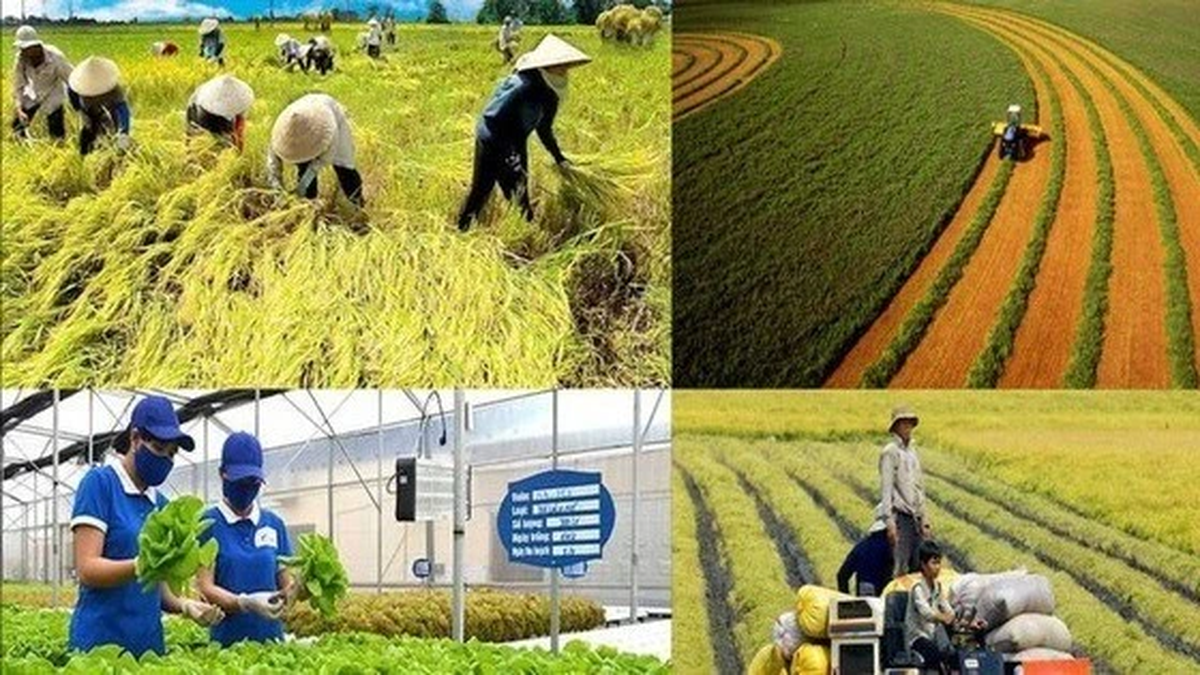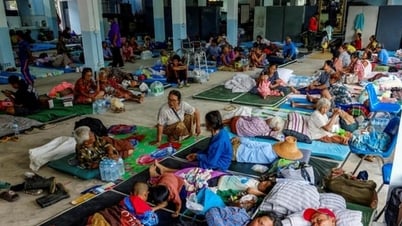 |
| The European Union (EU) is considering extending the gas price ceiling imposed in emergency in February 2023. (Source: Getty) |
World economy
Consequences of conflict in the Middle East on the global economy
On October 24, World Bank (WB) President Ajay Banga commented that the Israel-Hamas conflict could deal a "serious" blow to global economic development.
Mr. Banga's statement was made within the framework of the annual conference "Future Investment Initiative", taking place from October 24-26 in the capital Riyadh, Saudi Arabia.
According to the World Bank President, the recent events in Israel and the Gaza Strip have had a serious impact on economic development. He stressed that the world is in a "very dangerous" moment.
Meanwhile, Saudi Arabia's Public Investment Fund Governor Yasir al-Rumayyan warned of challenges as interest rates rise at the fastest pace since the early 1980s, causing significant and unpredictable disruption.
However, Mr. al-Rumayyan said that governments and businesses have made adjustments to match the tight monetary policies of central banks to control inflation. He also expressed optimism when witnessing rapid economic and productivity growth even in a high interest rate environment.
The conflict between Israel and the Islamist movement Hamas has raised alarm bells about the possibility of a prolonged conflict in the Middle East and the potential risk of destabilizing the global economy.
According to analysts, all conflict scenarios could push oil prices to record highs, inflation higher and global economic growth to slow down. In the worst case, world oil prices could rise to $150 a barrel. Global inflation is likely to rise to 6.7% in 2024, much higher than the International Monetary Fund's (IMF) current forecast of 5.8%.
US economy
* The US, the world's largest economy, could grow at its fastest pace in nearly two years in the third quarter of 2023 , helped by solid consumer demand.
According to the median forecast of economists surveyed by Bloomberg , US GDP grew 4.3% in the third quarter of 2023. This growth shows that the US remains the global economic powerhouse, as Europe's economy stagnates and Asia faces a slow recovery in China's economy.
Chinese Economy
* China will issue an additional 1 trillion yuan ($137 billion) tranche of government bonds in a move seen by experts as an effort to shore up the economy after a slow recovery from the pandemic.
The money will be distributed to local governments to support national disaster prevention and recovery. The government will issue the bonds in the fourth quarter of this year.
* Australian Prime Minister Anthony Albanese said on October 22 that China has agreed to review tariffs on wine imports from Australia, a move that paves the way for Canberra to end its dispute with Beijing at the World Trade Organization (WTO).
“We welcome China’s agreement to expeditiously review its tariffs,” Mr Albanese said in a press release, adding that the process was expected to take five months.
European Economy
* The European Union (EU) is considering extending the gas price ceiling imposed in emergency in February 2023.
Despite falling energy prices and record high gas reserves, supplies this winter could be affected by the Israel-Hamas conflict and disruptions to gas infrastructure in the Baltic Sea, senior EU officials said, adding that the EU needed an “insurance” policy to protect against such risks.
In that context, 10 EU member states have signed a request to the EC to extend the emergency legal measures that were applied during the previous energy crisis caused by the Russia-Ukraine conflict. The EC is expected to present a proposal in November.
* Eurozone business activity unexpectedly worsened in October as demand fell across the region, a survey showed.
Accordingly, the Eurozone Composite Purchasing Managers' Index (PMI), compiled by S&P Global and considered an indicator of economic health, fell to 46.5 in October 2023 from 47.2 in September 2023 and was the lowest level since November 2020. Excluding the Covid-19 pandemic, this is the lowest PMI level since March 2013. A PMI below 50 indicates a decline.
* Russian oil supplies are steadily rising, with shipments from the country’s ports in the week ending October 22 at around 3.53 million barrels per day, up 20,000 barrels per day from the previous week. This brings the four-week average to 3.5 million barrels per day, the highest since June 2023 and up about 610,000 barrels per day over the past two months.
Rising oil exports lifted Russia’s oil export tax revenue to a new high this year last week, while the four-week average rose for the 12th consecutive week, the longest streak since mid-January 2023.
* A document posted on the Russian government's website says the country plans to build two new railway corridors to China .
In the first stage, Moscow wants to build the North Siberian Railway (Sevsib). This line will run from Nizhnevartovsk (Khanty-Mansi Autonomous Okrug) to Bely Yar (Tomsk Oblast), as well as from Tashtagol (Kemerovo Oblast) to Urumqi (China).
The second railway corridor passes through the Republic of Tuva, the Kuragino-Kyzyl line. Next, the railway will pass through Mongolia. The second corridor in the West involves the construction of a line from Ars-Suri through the Mongolian city of Kobdo (Khovd) and the Chinese city of Takesheken to Urumqi.
* The head of Ukraine's energy company Ukrenergo Vladimir Kudrytsky said that the total debt on the country's electricity market has reached 60 billion hryvnia (more than 1.6 billion USD). The list of Ukrenergo's "creditors" includes power transmission, system dispatch and market balancing enterprises, and Ukrenergo is in a state of being unable to fully pay its obligations.
Mr. Kudrytsky said the company is waiting for a presumptive decision from the National Commission for Energy Regulation and Energy Regulation allowing Ukrenergo to maintain the company's liquidity.
* On October 24, Ukrainian Prime Minister (Denys Shmyhal) said that next year, the country will need about 42 billion Euros (44.62 billion USD) from international partners to cover the budget deficit during the conflict.
In the medium term, international support for Ukraine will help the country pay for most of its budget, Mr. Shmyhal stressed, expressing hope that the conflict will end as soon as possible.
A day earlier, Ukraine's Finance Ministry said the country had received a total of 22.2 billion euros in financial aid from the EU since the conflict with Russia broke out in February 2022. (Reuters)
* According to German MP Steffen Kotre of the Alternative for Germany party, a member of the Bundestag committee on energy and climate protection, the main source of gas supply in Germany is currently liquefied natural gas (LNG) from the US. This type of gas is much more expensive than the gas purchased from Russia in the past. Therefore, Germany is paying three to four times more for gas supplies .
Japanese and Korean Economy
* The Japanese government is considering spending about $33 billion on payments to low-income households and income tax cuts, as part of a package of measures to ease the impact of rising living costs on households, three officials said.
The estimated spending of around 5 trillion yen ($33.37 billion) will include a one-time income tax cut of 30,000 yen per person, along with a corresponding cut in the resident tax for foreigners of around 10,000 yen. The plan also includes payments to low-income households.
The spending plan will be formally decided by Prime Minister Kishida Fumio's Cabinet on November 2. Details of the tax cuts will be discussed by the tax council later this year. The plan is expected to be implemented by June 2024.
* According to IMF forecasts, the devaluation of the Yen will cause Japan's nominal GDP in USD terms to decline in 2023 and the country will have to cede its position as the world's third largest economy to Germany.
The IMF forecast also said that India - the country that has surpassed China to become the world's most populous country with more than 1.4 billion people, may surpass Japan in 2026. Accordingly, in the period 2026 - 2028, Japan will continue to fall to 5th place in the world while India will rank 4th in 2026 and 3rd in 2027.
 |
| South Korea's economy will recover slightly as inflation slows, but it still faces many uncertainties. (Source: Getty) |
* South Korea's economy is likely to lose its potential growth rate rapidly, possibly falling below 2 percent for the first time in history this year and even more worryingly next year.
The Bank of Korea (BoK) said on October 23 that such a bleak outlook means the country's potential growth rate will continue on a downward trajectory for at least 12 years after reaching 3.5 percent in 2013.
Potential GDP is defined as the maximum growth rate a country can sustain over the medium term while keeping inflation stable.
* The BoK said on October 23 that the country's economy will recover slightly as inflation slows, but still faces many uncertainties due to escalating geopolitical tensions and major economies raising interest rates.
In a report to the National Assembly, the BOK said the South Korean economy will recover modestly next year as the downward trend in exports improves, while private spending remains relatively weak.
Bank of Korea Governor Rhee Chang-yong forecasts the South Korean economy will grow 2.2% in 2024, but the Chinese economy and developments in the Middle East will influence the growth forecast thereafter. The Bank of Korea forecasts South Korean inflation at 3.5% in 2023.
ASEAN Economy and Emerging Economies
* Malaysia and China have announced an overseas venture incubator under the Belt and Road Initiative to enhance business cooperation between the two countries.
The announcement of the Business Incubator was made at the Malaysia Belt and Road Symposium 2023 held in Kuala Lumpur on 25 October to chart a roadmap towards the collaborative development of Madani Malaysia and the Belt and Road Initiative (BRI). The symposium also marked the inauguration of the Malaysia-China Belt and Road Institute (MCBRI) to promote academic cooperation between the two countries .
* Indonesian Cooperatives and Small and Medium Enterprises Minister Teten Masduki said that import substitution is one of four economic policies aimed at increasing domestically produced products, including those produced by micro, small and medium enterprises (MSMEs).
Speaking to reporters after the Cabinet meeting on October 24, Mr. Teten said: “The President even affirmed that 40% of the state budget expenditure (APBN) will be allocated to purchase domestic products from MSMEs .”
Through the import substitution policy, Indonesia will not need to import products if it can meet domestic demand. Products produced by foreign companies in Indonesia must have a domestic content of 40%. They are also required to cooperate with local businesses .
* Thai Deputy Finance Minister Julapun Amornvivat said on October 24 that the ministry plans to issue bonds overseas to attract the attention of foreign investors.
However, the Finance Ministry has yet to decide when the bonds will be sold, in what quantity and in what currency, Julapun said, adding that the government must consider the appropriate cost and timing.
The Thai government recently announced a $2 billion sustainability bond issuance that has attracted investor interest.
Source
























![[Photo] Signing of cooperation between ministries, branches and localities of Vietnam and Senegal](https://vphoto.vietnam.vn/thumb/1200x675/vietnam/resource/IMAGE/2025/7/24/6147c654b0ae4f2793188e982e272651)














































































Comment (0)